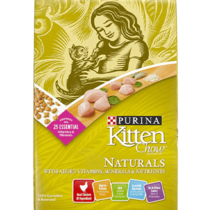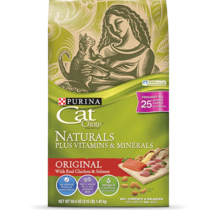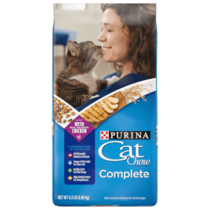
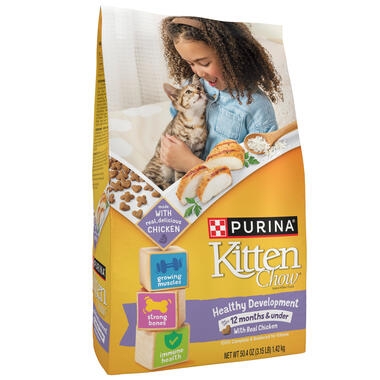
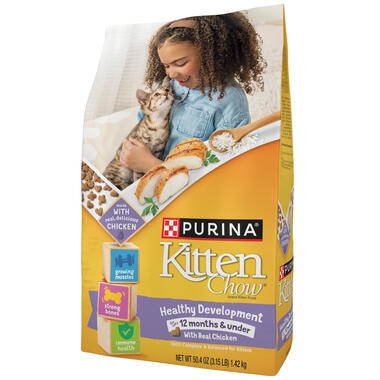
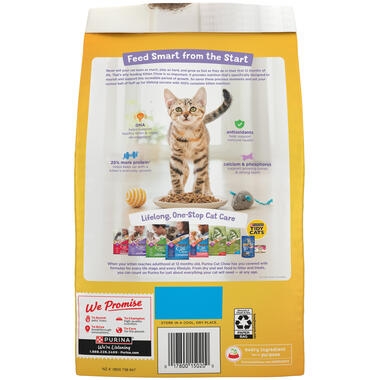




Kitten Chow Healthy Development Dry Cat Food
- High-protein cat food for kittens with DHA in every serving to support her brain and vision development as she grows
- Kitten Chow Healthy Development Dry Cat Food features the essential building blocks of nutrition to help her grow healthy and strong
- Cat kibble for kittens expertly prepared with high-quality ingredients and no artificial colors and flavours, so you can feel great filling her dish
- Your kitten has a lifetime of happiness ahead, and keeping her healthy from the start is the first step to a life well-lived
Kitten Chow Healthy Development Dry Cat Food
When it comes to what your cat eats, why not go natural? Kitten Chow Healthy Development Dry Cat Food leaves out the artificial additives and gives cats the nutrition they need with natural ingredients like real chicken, whole grains and a touch of leafy greens. High in protein like a cat’s natural diet, it’s a formula cats find naturally delicious, complete with a fiber blend to help control hairballs. Every meal of Kitten Chow Healthy Development Dry Cat Food provides complete and balanced nutrition, including essential vitamins and minerals.
- Provides All 25 Essential Vitamins & Minerals
- No Added Artificial Flavors or Preservatives
- High in Protein Like a Cat’s Natural Diet
- Natural Fiber Blend Helps Control Hairballs
- 100% Complete & Balanced Formula for Adult Cats
Ingredients
Chicken by-product meal, corn protein meal, rice, soy flour, animal fat preserved with mixed-tocopherols, ground whole wheat, chicken, fish meal, liver flavor, dried yeast, phosphoric acid, calcium carbonate, salt, choline chloride, MINERALS [zinc sulfate, ferrous sulfate, manganese sulfate, copper sulfate, calcium iodate, sodium selenite], VITAMINS [Vitamin E supplement, niacin (Vitamin B-3), Vitamin A supplement, calcium pantothenate (Vitamin B-5), thiamine mononitrate (Vitamin B-1), riboflavin supplement (Vitamin B-2), Vitamin B-12 supplement, pyridoxine hydrochloride (Vitamin B6), folic acid (Vitamin B-9), Vitamin D-3 supplement, biotin (Vitamin B-7), menadione sodium bisulfite complex (Vitamin K)], taurine, potassium chloride. L453023
Guaranteed Analysis
Crude Protein (Min) 40.0%
Crude Fat (Min) 13.5%
Crude Fiber (Max) 2.5%
Moisture (Max) 12.0%
Docosahexaenoic Acid (DHA) (Min) 0.02%
Calcium (Ca) (Min) 1.2%
Phosphorus (P) (Min) 1.1%
Selenium (Se) (Min) 0.3 mg/kg
Vitamin E (Min) 150 IU/kg
Taurine (Min) 0.12%
Calorie Content (calculated)(ME)
3705 kcal/kg
414 kcal/cup
RECOMMENDED DAILY FEEDING AMOUNTS
Using a standard 8oz measuring cup.
Age of Kitten Total Daily Amount Frequency
3 - 6 weeks 1/4 to 1/3 cup 3 - 4 times a day
7 weeks - 6 months 1/3 to 3/4 cup 3 - 4 times a day
7 months - 1 year 1/2 to 3/4 cup 2 times a day
Feeding Kittens
Kittens generally nibble solid foods at 3 - 4 weeks of age. Keep moistened Kitten Chow Healthy Development available to these kittens at all times. Just add one part liquid to three parts Kitten Chow Healthy Development, changing frequently to ensure freshness. After weaning, at 6 - 8 weeks of age, kittens will normally eat dry or moistened food at will. Start a self-feeding program, leaving food in dish at all times. Feeding amounts should be adjusted as necessary to help your kitten maintain an ideal body condition. Because kittens continue to develop throughout their first year, it’s important that they get the extra nutrition of Kitten Chow Healthy Development for a full 12 months. After one year of age, transition to the Cat Chow formula that’s right for your cat.
Feeding for Reproduction
Kitten Chow Healthy Development provides the extra nutrition needed by reproducing females in stages of gestation and lactation. Food consumption may vary during gestation, so feed the amount needed to maintain the pregnant female’s good body condition. Food intake may double or even quadruple during lactation.
Feeding Tip
Changes in your cat’s diet should be made gradually to allow your cat to become accustomed to a new food. Substitute small amounts of the new food for the old food, gradually increasing the amount of the new food while decreasing the old food, over a period of 7 - 10 days. This gradual transition will help avoid dietary upsets.
Provide adequate fresh water in a clean bowl daily.

